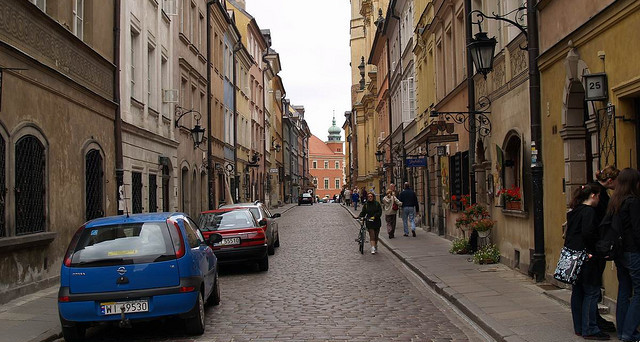
I remember that sunny May evening in Warsaw. I was walking down the Krakowskie Przedmiescie towards the gates of the Old Town, where I was supposed to meet my friend. I felt this refreshing wind mixed with warm sunbeams on my face. The sun was still up above roofs of Warsaw’s tenement houses from the 19th century. I was not thinking about anything in particular. I was walking alone, enjoying the cloudless sky. My only dilemma was whether to wear my sunglasses or not. The roofline of the buildings along the street was uneven. Whereas higher buildings were hiding the sun, lower ones allowed it to blind me when I turned my head to the left. On Thursday evenings this part of the city always has the same relaxing vibe. Everyone moves in slow motion. Nobody runs. Nobody screams. Some people stop to take pictures or just to look at monuments along the street. While walking, you may hear people’s conversations, which drown out the sporadic noise of cabs. You can feel a fresh spring breeze, and smell blooming irises, which announce summertime.
Nowadays Warsaw is a vivid, hectic place. A lazy mood like this does not belong to the city. Taking into account its history, this unshakable peace seems even ironic. It feels like the calm before the storm. I was still walking, slowly approaching the old town. I looked at my watch. It was quarter past seven. I had plenty of time to get to the place where I was supposed to meet my friend. As the sun started to set I walked into a narrow street of Warsaw’s oldest part. All of a sudden, the idyllic atmosphere disappeared. The steep roofs of high old buildings blocked sunlight making Swietojanska street dark and gloomy. On my right, I saw two homeless musicians playing some Polish rock songs from the 80’s. Their guitars were out of tune. They were performing by St. John’s Cathedral, and one of them was sitting at an old wall, which did not fit the surroundings. It was out of tune, just like music they were playing. It was dirty and older than other walls. I could recognize traces of bullets on it. Behind my back I heard English-speaking tourists. They passed by admiring and commenting on the architecture of nearby buildings. They did not pay attention to this wall, which was the essence of the Old Town. I believe somebody left this wall on purpose.
“Why didn’t they stop?” I thought. You cannot walk through the Old Town thinking only about 17th century architecture. Some tourists do not even realize these buildings are not historic at all. In fact, today’s Old Town is 70 years old. During the Second World War, the Germans destroyed over 90 percent of the old town; 90 percent of buildings, love stories, smiles, dreams, and tears. It was priceless. We may rebuild houses and streets, but we will never recover people, feelings, and that unshakable peace.
On the 1st December 2012, we lost Wislawa Szymborska, a Polish Nobel prize winning poet. In one of her poems she writes about Adolf Hitler:
“Precious little angel, mommy’s sunshine, honeybun,
while he was being born a year ago,
there was no dearth of signs on the earth and in the sky:
spring sun, geraniums in windows,
the organ-grinder’s music in the yard,
a lucky fortune wrapped in rosy paper,
then just before the labor his mother’s fateful dream:
a dove seen in dream means joyful news,
if it is caught, a long-awaited guest will come.
Knock knock, who’s there, it’s Adolf’s heartchen knocking.
The Klinger Atelier, Grabenstrasse, Braunau,
and Braunau is small but worthy town,
honest businesses, obliging neighbors,
smell of yeast dough, of gray soap.
No one hears howling dogs, or fate’s footsteps.
A history teacher loosens his collar
and yawns over homework.”
Finally, I got to my destination. My friend was already waiting for me. He asked, “Where are we going? Do you want to stay in this area?” I offered to go to New Town, which is an actual name of one of Warsaw’s districts. We are young, and do not want to reflect on the past too much. But, I was still thinking about the Old Town, about the people who died from the bullets, which left traces on the wall of St. John’s cathedral. That evening, I managed to escape from dark thoughts. Certainly, the beers I got at a bar helped me to look optimistically into the future, my bright future. Seventy years ago, my peers did not have any place to escape, nor did they have a bright future.





